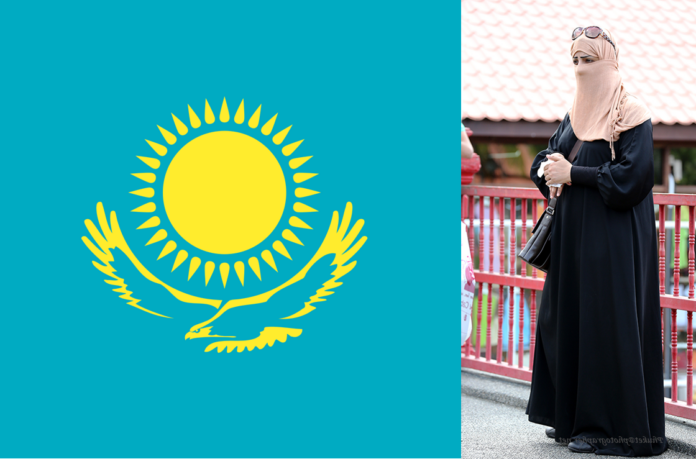Kazakhstan’s president, Kassym-Jomart Tokayev, has approved a law forbidding clothing that hides the face or obstructs facial recognition in public spaces, permitting such attire only for medical reasons, severe weather, official duties, or designated events.
Tokayev described the measure as a cultural affirmation, explaining that “rather than wearing face-concealing black robes, it’s much better to wear clothes in the national style.” He emphasised national attire over veils that obscure the face.
The law is part of a broader legislative package enacted on June 30, 2025, focussing on clothing that “interferes with facial recognition.”
This new face-covering restriction builds on those earlier educational prohibitions, aligning policy with a broader aim to replace Islamic attire with national dress.

In October 2023, Kazakhstan introduced a ban on headscarves for students and teachers in schools, sparking protests.
Around 150 schoolgirls are believed to have left their studies in protest against the ban on religious attire in educational institutions.
Government statistics show that Muslims make up nearly 70 per cent of Kazakhstan’s population, with Christianity ranking as the next most followed religion.
Subscribe to our newsletter and stay updated on the latest news and updates from around the Muslim world!
Kazakhstan’s move is part of a wider trend in Central Asia, where secular governments have implemented restrictions on face-veiling:
In Kyrgyzstan as of February 1, 2025, wearing the niqab or similar face-covering in public is banned under amendments to the Religious Sphere Act. Violators face fines up to 20,000 Som (£180), and police patrol streets and public venues to enforce the law
In 2023, the Uzbekistan government prohibited burqas and niqabs in public spaces, citing security concerns. Penalties exceed US $250 for violations
In Tajikistan during June 2024, amendments to the Law on traditions banned clothing “foreign to national culture,” effectively outlawing hijabs, niqabs, and burqas.
Fines range from 8,000 to 54,000 somoni (£580–£1,330 GBP), higher for officials and religious figures.

This follows earlier unofficial bans on headscarves and beards in Tajikistan that included police enforcement and educational restrictions.
These measures reflect a regional pattern in Central Asia of enforcing secular identity through clothing regulations.
Motivations:
The law declares, “Wearing items of clothing in public places that impede facial recognition is prohibited,” with exceptions allowed “where this is necessary to comply with the laws of the Republic of Kazakhstan, fulfil official duties, or for medical, civil defence, weather-related or event-specific purposes.”
President Tokayev has described the ban as a chance to promote Kazakhstan’s ethnic heritage. He told Kazakh media, “Rather than wearing face-concealing black robes, it’s much better to wear clothes in the national style.”
He added, “Our national clothes vividly emphasise our ethnic identity, so we need to popularise them comprehensively.”
Officials across the region frame these laws as essential for public safety and cultural integrity. Critics, however, warn they compromise personal freedoms and religious expression.
Although designed to bypass direct references to religion, the bans disproportionately impact Muslim women.
In Kyrgyzstan, a woman told a Reuters reporter that her life became “complicated” and she now wears a medical mask instead of a niqab.
Kyrgyzstan’s law has been criticised by the International Partnership for Human Rights for threatening civil liberties and limiting women’s access to education and healthcare.























